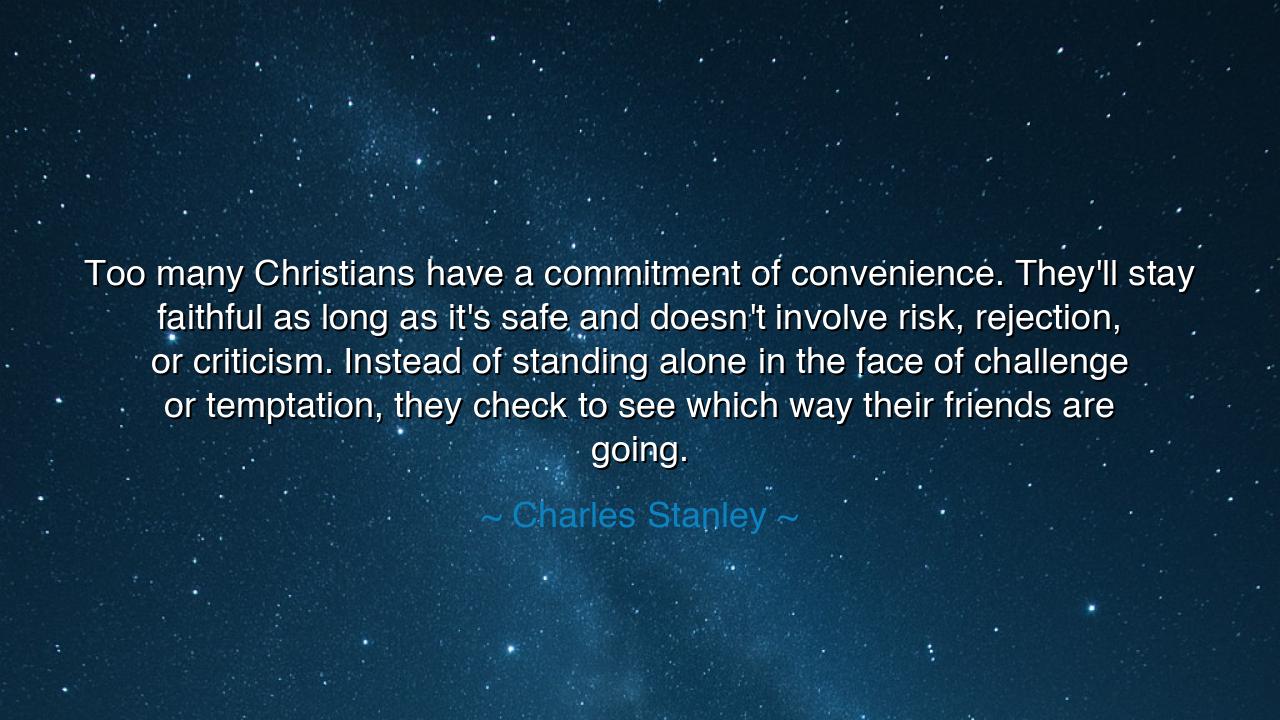
Too many Christians have a commitment of convenience. They'll
Too many Christians have a commitment of convenience. They'll stay faithful as long as it's safe and doesn't involve risk, rejection, or criticism. Instead of standing alone in the face of challenge or temptation, they check to see which way their friends are going.






“Too many Christians have a commitment of convenience. They’ll stay faithful as long as it’s safe and doesn’t involve risk, rejection, or criticism. Instead of standing alone in the face of challenge or temptation, they check to see which way their friends are going.” — thus spoke Charles Stanley, the steadfast preacher of faith and endurance, a man who called his followers not to comfort, but to courage. In these words, he casts light upon one of the oldest struggles of the human spirit — the battle between conviction and convenience, between the easy path of the crowd and the lonely road of truth. His voice, echoing through time, reminds us that faith without trial is hollow, and devotion without sacrifice is but a shadow of belief.
The origin of this teaching lies in Stanley’s lifelong ministry and his observation of modern believers drifting toward complacency. In an age of comfort and abundance, he saw how easily faith becomes fragile — practiced only when it pleases, and abandoned when it costs. To Stanley, such faith is not faith at all, but fear disguised as devotion. True faith, he taught, is forged in hardship; it shines brightest not in the sunlight of approval, but in the storm of opposition. Like the saints and prophets of old, the believer must be willing to stand alone, to defy the tide of opinion and remain unmoved when the world calls him foolish or fanatical.
His words recall the timeless stories of those who refused to compromise when tested. Daniel stood alone in Babylon, praying to his God though it meant the lion’s den. Moses, facing Pharaoh’s wrath, chose the scorn of the court over the safety of silence. Jesus Christ Himself, abandoned by His disciples, carried the cross alone through jeering crowds. In every age, the faithful who rise above convenience are those who choose conviction over comfort. They do not look to see which way the wind blows, for they are anchored not in approval, but in truth. Faith that depends on popularity is no faith at all — it is imitation, not devotion.
Stanley’s warning strikes deep at the heart of modern life. Today, the temptation of approval is greater than ever. Men seek the applause of peers more than the peace of conscience; they fear rejection more than sin. But true discipleship, he reminds us, demands courageous isolation. The faithful man must be willing to walk the desert of disapproval, to bear misunderstanding with grace, to suffer criticism without retreat. It is easy to believe when surrounded by believers — harder, yet holier, to stand firm when surrounded by doubt. For the flame of faith, like gold, is proven only by the fire.
Consider the story of Dietrich Bonhoeffer, the German pastor who resisted the tyranny of Hitler’s regime. When others bowed before the idol of political safety, Bonhoeffer chose the perilous path of truth. He spoke against injustice though it cost him his freedom, and in the end, his life. His commitment was not one of convenience, but of conviction. Alone in his prison cell, he wrote, “When Christ calls a man, He bids him come and die.” Bonhoeffer’s life stands as living proof of Stanley’s words — that the faith which endures the furnace is the only faith that truly saves.
Yet Stanley’s message is not one of despair, but of empowerment. He reminds us that though the path of conviction may be lonely, it is never truly empty. God walks beside those who walk in truth. To stand alone in righteousness is not to be forsaken, but to be joined with the strength of heaven. Every act of steadfastness — every refusal to bow to fear, every moment of quiet courage — becomes a testimony that echoes through generations. The one who remains faithful in hardship becomes, in time, the light that guides others through their own darkness.
The lesson, then, is clear and eternal: do not let your faith be a matter of convenience. Let it be the rock upon which no storm can shake you. When temptation whispers, when the crowd mocks, when fear demands compromise — remember that the approval of men fades, but the favor of truth endures. Stand firm in what is right, even if you must stand alone. The fire of criticism may burn for a moment, but the peace of integrity endures forever.
So let the words of Charles Stanley dwell in your heart as a call to courage: “Too many Christians have a commitment of convenience.” Refuse to be among them. Live with a faith that costs, a conviction that does not waver when tested. For in the end, it is the solitary stand — the moment when one soul refuses to yield — that shapes the destiny of nations and sanctifies the name of God. Stand, then, not because it is easy, but because it is right.






AAdministratorAdministrator
Welcome, honored guests. Please leave a comment, we will respond soon